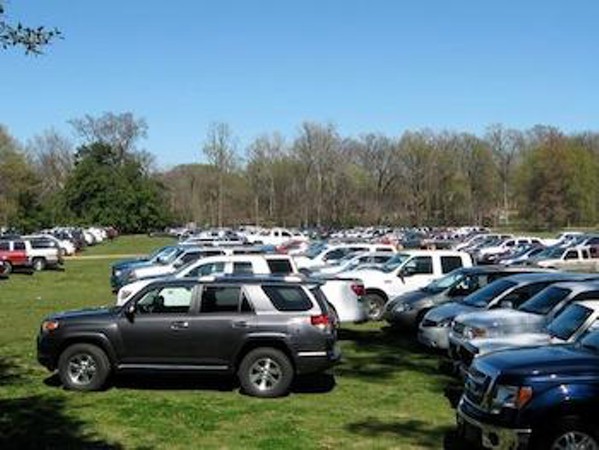The recent issue of the Memphis Flyer featured an update on the controversy concerning zoo parking on the greensward at Overton Park, but the most interesting aspect of the lead story was what appeared to be trial balloons lofted by City Hall.
One, there was the suggestion of an agnostic attitude about the parking problem at Overton Park, that is, zoo parking intruding onto the greensward. That was unfortunate because in a city where too much preference is given to cars in public decisions, families looking for an enjoyable day in the park now can find it defined by dust and exhaust fumes.
In a city that has ranked low for many years on its commitment to parks as evidenced by its place at the bottom of the list of U.S. cities when it comes to park acreage and park funding, surely, we can all be true believers of the doctrine that the purpose of parkland is first and foremost for park activities.
For that matter, if we want to really be agnostic on solutions, how about parking cars on the golf course and letting zoo-goers walk from there? Such a suggestion would likely provoke head-shaking in City Hall, which underscores the double standard that surfaces when it comes to the greensward.
Bonds for a Public Purpose
Two, there was the suggestion that there is no potential for a garage at the present East Parkway location occupied by City of Memphis General Services because the site has been promised for a museum for famed Memphis photographer William Eggleston and discussion of a garage there would lead to the collapse of the deal.
The people behind the Eggleston Museum are some of Memphis’s leading and most conscientious citizens, and it’s hard to imagine that they would take a “my way or a highway” attitude when they can contribute to a parking solution as part of their consideration for some extremely valuable public parkland. More to the point, City of Memphis has the ultimate leverage in this discussion since it owns the land.
Third, there was the suggestion that the $5 million, 400-space parking deck given as a parking option by Mayor Wharton is not an appropriate use of city general obligation bonds because it does not support business activity. Frankly, if a parking garage at Overton Park can resolve the parking problem there, that seems precisely what general obligation bonds were created for. Come to think of it, a publicly-funded garage on public land for a public purpose seems the very essence of general obligation debt.
Even in a city obsessed with economic impact studies about issues that should be valued for their own intrinsic value (think: arts, culture, and parks), the justification for a parking garage is an easy one to make.
A Bargain for Huge ROI
More to the point, using Mayor Wharton’s estimate, the yearly bond payments for a garage would amount to about $350,000, or about $6,730 a week to support one of the top 10 tourist attractions in the State of Tennessee. Because of the pride that we all have in the zoo and the considerable positive national publicity that it provides for Memphis, we believe that there is a reasonable chance that a majority of City Council members would support an investment in an asset that has grown to be one of the best zoos in the country with a modicum of city government funding and with a level of private and philanthropic support seen in much larger cities.
Considering that the zoo attracts more than one million people to the heart of the city, where they visit nearby restaurants and where their admission tickets and purchases at the zoo produce much-needed revenues for the City of Memphis, the suggestion that city government should not be willing to pay for a garage is illogical in the extreme.
Fourth, there was the suggestion that public-private partnerships like the Overton Park Conservancy have too much power. While the comment was directed at parks specifically (such as Audubon Park and Morris Park), we presume that misgivings of this kind would also apply to organizations like Riverfront Development Corporation, Memphis Botanic Garden Foundation, and even the Memphis Zoological Society.
This is a topic that deserves debate and discussion and has bubbled beneath the surface for years, but the fact that it surfaced in the midst of discussions with Overton Park Conservancy all but said it was provoked by this new park organization.
It’s About People, not Cars
From where we sit, the Overton Park Conservancy has done a superb job of representing the public’s interest in its signature park. From the process to gather public opinion and preferences prior to its creation to involving the public in setting its agenda, the Overton Park Conservancy has shown how an organization of its kind can aim higher, develop bolder goals, and execute quality projects.
That the Conservancy was created because of the benign neglect of city government when it comes to parks generally but Overton Park specifically goes without saying, and while the discussion about the role of private nonprofit organizations in the operations of city marquee assets is a discussion worth having, we hope that it somehow doesn’t devolve into a debate centered on the Overton Park Conservancy, which has a blue-ribbon board that includes Mayor Wharton’s own daughter-in-law.
We remain confident, based on Memphis Mayor A C Wharton’s actions, that the mayor is supportive of preserving the greensward for families rather than seeing its future as a site for overflow parking for the zoo. Best of all, the mayor has not given any indication that he is approaching this issue as a negotiation but as the search for a definitive solution that protects this historic park.
We suspect that at the end of the day, the Wharton Administration will do what is best for users of a park that happens to have a zoo in it, rather than treat it as a zoo that happens to have adjacent parkland.
Our previous post about the parking controversy from May 22: Parking the Emotions and Finding Solutions in Overton Park





While the city no doubt has little stomach for another Overton Square garage, it is also interesting that the final report prepared by Tetra Tech notes this exact site as one of 9 locations for additional stormwater detention necessary to alleviate flooding within the Lick Creek Basin. Their notes and concept: “Drainage canal runs adjacent to this area and can easily be diverted to underground detention beneath proposed parking garage at the Memphis Zoo”. In 2011, this renowned engineering and design firm saw the simple logic in a solution that could resolve 2 separate issues.
I’m not sure what you’re saying.
Thoroughly agree with the article’s observations. Fair disclosure: I am a non-voting member of OPC Board representing Evergreen Historical District – whose residents heavily use and enjoy all of the park’s amenities. Ironically, for years the zoo has done nothing to solve the parking problem, basically because they were not motivated to do anything. I firmly believe that public opinion has helped and will continue to help acclimate the will of the zoo to engage in formulating solutions to the parking issue. One of the best zoos in America can afford to build a multilevel parking garage – merely add 25 or 50 cents to the ticket price and the financing can be debt serviced in a short time. People of Memphis, let’s make this happen.
Thanks, Ray, for an insider’s view.
I must agree with SCM , the Memphis Zoo is in a constant state of fundraising for new exhibits that will drive additional traffic.
Going to the Zoo is an expensive undertaking for a family. At $15 for admission the Zoo must keep guest comfort and convenience as a paramount concern.
Providing parking for their guests without upsetting the balance of the park environment should be a given in.
The board of directors for the Zoo includes the most powerful, intelligent and wealthy of Memphis. They can get this done. A parking garage that meets the Zoos future needs should be built. In exchange for building the garage the Zoo should provide low cost or free Zoo admission for poor and deserving youth.
The Overton Park Conservatory has been a Godsend for the park. Overton Park is our premier city park. It houses our most important cultural institutions. The Conservatory’s area of responsibility should be expanded to include the golf course.
What has always surprised me is that International Paper is not a major funder of the Conservatory. With conservation and forestry as part of the corporate mission this seems like a natural tie in and a way to give back.
Make of it what you will, but the stock prices of every major locally based corporation is at a 52 week high. I hope that the enormous local wealth being created in the markets will benefit local non-profits.